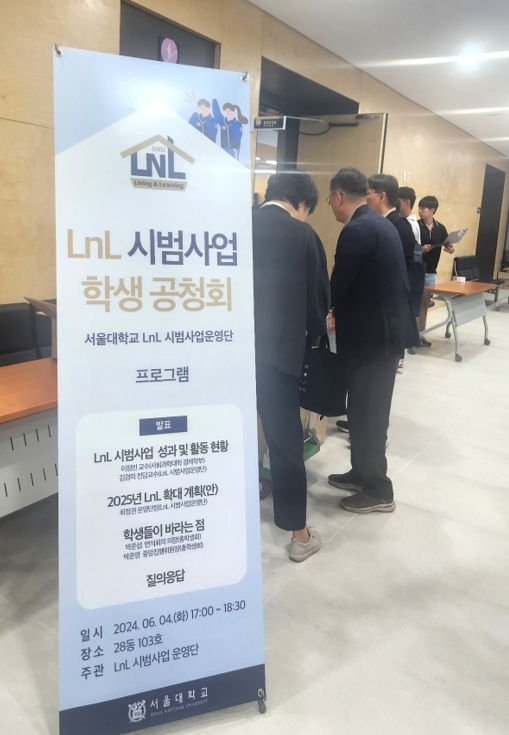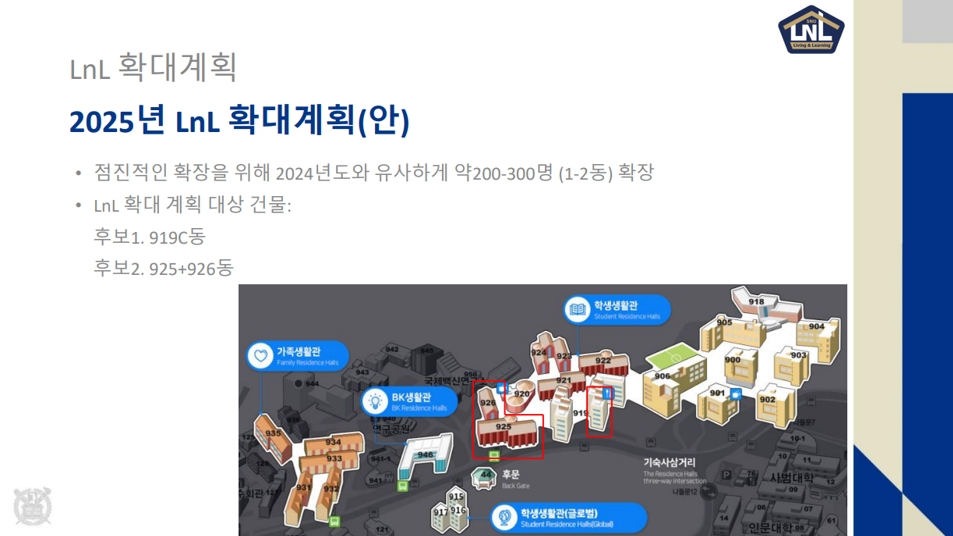The open discussion for the Living and Learning (LnL) project took place on June 4. First launched in 2022, the LnL pilot project aims to provide a holistic education approach that harmonizes academic learning with communal living. As the project wraps up its third semester, the event was a chance to exchange feedback and information on the project so far.

The open discussion of LnL in preparation
Professor Kim Kyeongmi, in charge of the LnL pilot project, started the event by introducing the main vision of the project. Overall, she explained how the LnL aimed to act as a platform to help students enrich themselves and become global citizens. The two features of the project that the professor highlighted were the LnL Gwanak Omnibus Course and the LnL Peer Group Seminar. The Omnibus Course for this semester provided students the opportunity to listen to lectures from professors of various fields under the theme “Sustainable Communities: Overcoming the Challenges.” In the Peer Group Seminar, help was given to students to further explore their academic interests through encouraging independent research.
Next, the performance evaluation results were presented by Professor Lee Jungmin (Department of Economics) based on a survey conducted on students to assess the overall student satisfaction of school life. Approximately 70% of the students responded, revealing significant differences between those who experienced the LnL project and those who did not. The most notable difference was in the interest for pursuing double or minor majors, with LnL participants showing a 15 percentage point higher interest than non-participants. This increased interest in major diversity can be attributed to the benefits of interacting with a diverse group of students through LnL’s special courses, highlighting the project's effectiveness.
Professor Choe Jong Kwon (Department of Civil and Environmental Engineering), head of the LnL pilot project team, then presented the expansion plans of the project. The professor explained how the project plans to expand to include 200-300 students to provide the opportunity for more students. He highlighted that the expansion would take the students’ worries into consideration. For example, one key concern students had was regarding the gender ratio of dormitory placements. Since the LnL Residential College is using what was previously a men’s dormitory building, students were concerned that expanding this project would further create gender ratio imbalances. Among others, Professor Choe assured participants that plans would be in place that would ensure such issues would not arise.

Explanation of the two expansion plans
Representing the student body, the student council then delivered direct feedback from the students. The feedback was generally suggestions to improve areas of the project, such as developing the Peer Group Seminar so that students could have more time to prepare. There were also comments asking for more consistency in the extracurricular activities. These insights from the student council reflect a proactive approach to refining the project and addressing the specific needs and aspirations of the student community.
Overall, the open discussion session was an opportunity for the project to receive healthy and meaningful feedback. Participants expressed optimism about the project's future impact and potential growth, highlighting the importance of continued collaboration and innovation. This positive outlook underscores a collective commitment to developing the project, setting the stage for the next step of SNU’s LnL.
Written by Jeemin Suh, SNU English Editor, jiminasuh@snu.ac.kr

